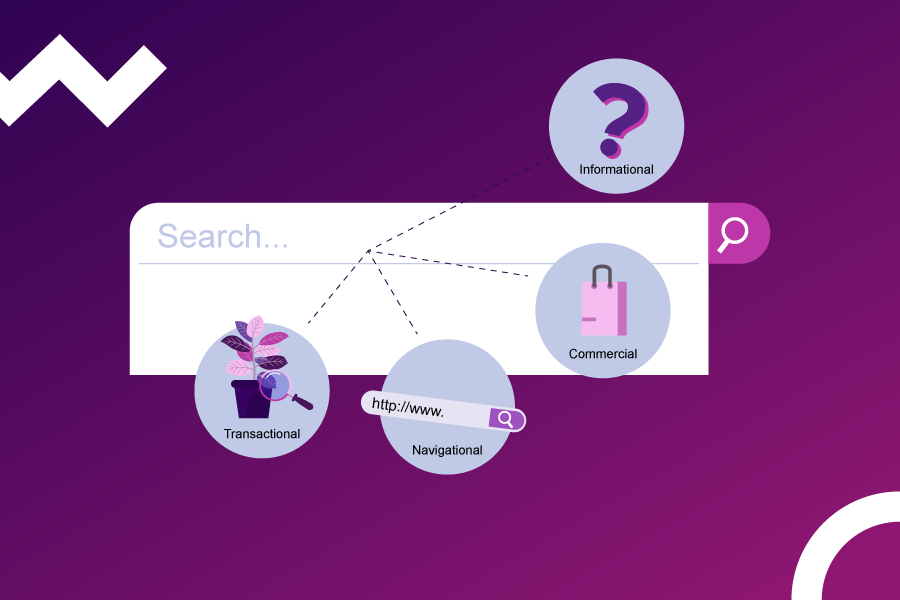If you want your SEO strategy to succeed, aligning your web copy and content with your audience’s search intent is a must. In fact, search intent is one of the driving factors considered by search engines when ranking your site. But, what is search intent? And, how does it work?
In this post, you’ll learn more about search intent and the importance of taking it into account when creating content for your blog and other web pages.
Search Intent
Search intent refers to the purpose of a search or, in other words, the reason why a person looks up a query using a search engine.
Anyone using a search engine is looking for something. In order to be efficient, search engines have to understand exactly what you are looking for in order to be able to deliver results that are useful to you. That’s where search intent comes in. by understanding what your purpose is when completing a search, search engines can do a better job by pointing you in the right direction.
Why Does Search Intent Matter?
“Content is king” is a phrase you’ll hear all SEO experts throwing around. But, what really defines “good” content?
Easy.
Good content is simply content that meets your visitor’s needs, or in other words, that aligns with your visitor’s search intent.
In fact, with each update to its algorithm, Google strives to deliver the search results that are the most relevant to its users. It does this by getting specific about what its users really want.

Put simply, if you are looking for a funny meme, Google wants to be able to deliver as quickly and efficiently as possible.
To best serve this purpose, Google is constantly evolving to better understand what people are looking for and most importantly why people are looking for it. When looking at SEO data, this translates into keywords and keyword search intent.
Let’s illustrate this with an example. Let’s say you are trying to rank for a keyword related to “lemon pie”. Let’s say this same keyword has an informational search intent and that most search results ranking for it are recipes. However, the page you optimize around said keyword is a landing page advertising pie molds. In this case, people looking up said keyword. as their search query will most likely be looking for a recipe and not be interested in your content or product. That means you’ll experience high bounce rates and low rankings. It also means that any traffic you do get on this page will be unlikely to convert.
On the other hand, when you optimize your content around a keyword taking into account its search intent, your content will always be relevant to the user. Not only is this recognized by Google and other search engines, positively impacting your ranking, but it also helps you attract the type of traffic you are looking for and make the most out of it.
You simply won’t rank if you don’t deliver the right type of article that Google expects to see for a query.
Matt Diggity
4 Types Of Search Intent
There are many different reasons why people use search engines. However, most commonly, search intent can be categorized into 4 main types. Let’s take a look at each one.
Informational
You have questions. Google has answers.
Let’s begin with the informational search intent. A great number of online searches are done for the sole purpose of obtaining more information about a topic or answering a question. Tutorials, educational articles, news reports, interviews, and weather reports, for example, all fall under the informational search intent category.
Here are some examples of informational search intent:
- Using Google to find out the number of continents in the world.
- Using a search engine to find a tutorial to sew on a button.
- Completing research to find out more about a recent scientific discovery.
Commercial
The vast majority of people recur to the internet to conduct some research before choosing to make a purchase. As they evaluate a future purchase, potential buyers compare different product options, read customer reviews, and watch video unboxings. Searches conducted for this purpose fall under the category of commercial search intent.
For example, let’s say you are interested in purchasing a camera in the near future but are on the fence between two different models. You then go to google to find out the differences between the two before making a choice. In this case, the user’s search intent would be commercial.
Transactional
With e-commerce holding an ever-expanding hold over the economy, more and more people are partaking in online shopping. Unlike commercial search intent, where people use search engines to complete their research when considering making a purchase, people search with a transactional intent when they are ready to complete a purchase. In this case, search engines are used with the purpose of finding a product and service page and immediately purchasing.
For example, let’s say you’ve decided to purchase an iPhone today. If you go directly to Google to search for the latest iPhone and order your new phone, that would be transactional search intent.
Navigational
Last but not least, we have navigational intent. This type of search takes place when a user goes to a search engine to find a specific website. For example, if a customer is looking to visit your website and uses Google to type in your business’ name and find your site, this would be navigational intent.
Keywords with this type of search intent have less relevance in content marketing since people are looking for a specific page.
How to Optimize Content For Search Intent?
In order to optimize your website for search intent, you have to select the right keywords.
Here’s why.
If you choose a keyword with an informational search intent to optimize a page you have to keep in mind that people won’t want to see transactional content such as a product page. Any traffic you get in this case would be very hard to convert.
At the same time, if you have a keyword with transactional intent, the most likely scenario is that people looking for that keyword are ready to purchase. The last thing they want is for a long blog post to interrupt their purchase.
When it comes to optimizing for search intent the process is simple. Optimize your informational content, such as blog posts and case studies, around keywords with informational search intent. Optimize your product and service pages around keywords with commercial or transactional intent. Alignment is always the key.
Conclusion
By now, you should have the answers to the following questions:
- What is search intent?
- What are the types of search intent?
- Why does search intent matter?
You are now ready to create relevant content and web copy that aligns with your audience’s needs. However, you should not forget that search intent is just one of the many factors that must be taken into account during content creation. Keyword research and selection, on-page optimization, and technical SEO are among the other things to consider.
Sounds like a lot? Worry not! You can leave the heavy lifting up to our marketing wizards, who can help you with anything from content marketing strategy to content writing and content distribution.
